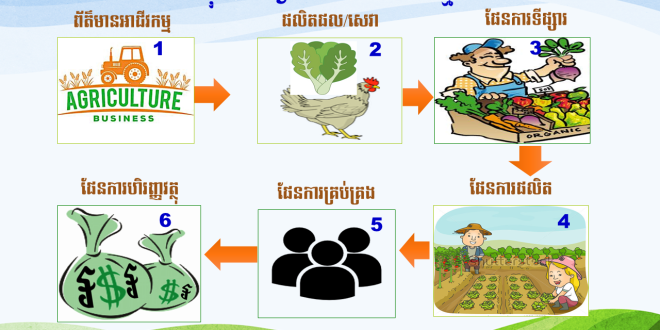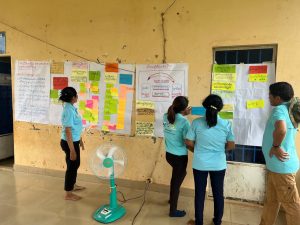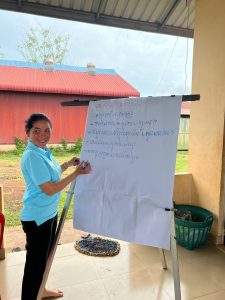Business plan provides a comprehensive framework for the agricultural cooperative to plan, implement, and manage its operations effectively, while ensuring the long-term viability and success of the organization.
From November 2021 to July 2023, CamboDHRRA provided capacity development on business planning to 30 agricultural cooperatives in Kampot, Kampong Speu, Kampong Chhnang, Battambong, Siem Reap, Utdor Meanchey, Preah Vihea, Steung treng, Kampong Thom and Prey Veng provinces. Each agricultural cooperative received three-day training. In total, there are 197 board of directors, internal control committees and personnels included 96 women and 36 youth were capacitated on business planning to equips board members and personnels with the necessary skills and knowledge to effectively lead, govern, and strategically guide the agricultural cooperative towards long-term success. It enhances their decision-making abilities, fosters collaboration and communication, and promotes the cooperative’s growth and sustainability.
In addition, after the training, an expert of CamboDHRRA mentored agricultural cooperatives to be available to answer questions, to provide guidance, to empower them to take ownership of their business planning process and offer support as agricultural cooperatives implement their business plan.
The capacity development was made through partnership between Chamroeun Microfinance PLC and CamboDHRRA under the SSNUP program (Smallholder Safety Net Upscaling Program).
It’s noted that business plan is important for an agricultural cooperative as followings:
Strategic planning: The business plan helps the agricultural cooperative in setting its long-term goals and objectives. It provides a roadmap for achieving those goals, and it outlines the strategies and tactics to be implemented.
Financial management: The business plan outlines the financial aspects of the cooperative, including its sources of revenue, expected expenses, and projected profits. It helps in securing funding from members, investors, financial institutions, or government grants.
Risk management: By analyzing the market conditions, competitive landscape, and potential risks, a business plan helps an agricultural cooperative identify and address potential challenges in advance. It allows for contingency planning and risk mitigation strategies.
Operational efficiency: The business plan provides guidelines for the day-to-day operations of an agricultural cooperative. It outlines the organizational structure, roles, and responsibilities of the team members, and the processes and systems to be followed. This helps in improving efficiency and productivity.
Marketing and sales: The business plan helps agricultural cooperative identify its target market, understand customer needs and preferences, and develop marketing and sales strategies accordingly. It ensures that resources are allocated effectively to reach and attract customers.
Communication and coordination: The business plan serves as a communication tool within agricultural cooperative. It helps in aligning the members’ understanding and expectations regarding agricultural cooperative’s mission, vision, and values. It provides a common platform for discussions, decision-making, and coordination among the stakeholders.
Expansion and growth: The business plan enables agricultural cooperative to assess its growth potential and explore opportunities for expansion. It helps in identifying new markets, diversifying product offerings, or implementing new technologies, thereby leading to sustainable growth.

 Cambodhrra Cambodian Partnership for Development Human Resource in Rural Area Association
Cambodhrra Cambodian Partnership for Development Human Resource in Rural Area Association








